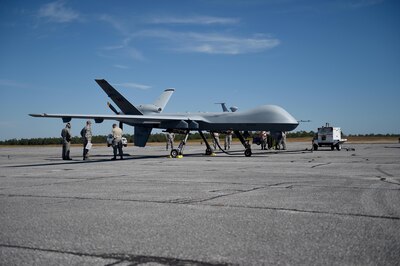By Air Force Senior Master Sgt. Robert Shepherd, 132nd Wing,
Iowa Air National Guard
DUKE FIELD, Fla., Nov. 17, 2017 — Airmen with Air National
Guard units from Texas, New York, Iowa, Ohio, California, Tennessee,
Pennsylvania, Arkansas, and North Dakota supported and piloted MQ-9 Reaper
unmanned aerial vehicles during Operation Combat Hammer, the first operational
air-to-ground weapons evaluation for the Air National Guard that includes the
Reaper.
The Combat Hammer exercise takes place twice each year at
Eglin Air Force Base, Florida, and twice annually at Hill Air Force Base, Utah,
and is part of the Weapon System Evaluation Program. WSEP has two parts: Combat
Hammer evaluates all Air Force air-to-ground weapons, mostly bombs, while
Combat Archer evaluates all air-to-air weapons, mostly missiles.
Realistic Training
“WSEP is an opportunity for the Air National Guard to
provide our warfighters with ‘as real as it gets’ combat training outside of
the combat zone, said Air Force 1st Lt. Josh, WSEP Project Officer for 132nd
Wing, Des Moines, Iowa.
The 53rd Weapons Evaluation Group out of Eglin AFB conducted
a maritime Weapons System Evaluation Program in the Gulf of Mexico and in
Choctawhatchee Bay, Nov. 1-3 and Nov. 6-8. Within the 53rd WEG, the 86th
Fighter Weapons Squadron is the lead for Combat Hammer.
"As a whole, Combat Hammer has to do that on a much
larger scale since we have three to four units here each WSEP. A lot of hours
by a lot of people go into making this happen, and it couldn't be done without
a whole team effort," said Air Force Maj. Marcus, the assistant director
of operations for WSEP at the 86th FWS, Eglin AFB.
Exercise participants this year included F-22 Raptor
aircraft, from the 94th Fighter Squadron at Langley, AFB, Virginia; F-16
Fighting Falcon aircraft, from the 55th Fighter Squadron of Shaw AFB, South
Carolina; A-10 Warthog aircraft from the 75th Fighter Squadron of Moody AFB,
Georgia; and MQ-9 Reaper UAVs with Air National Guard units from Texas, New
York, Iowa, Ohio, California, Tennessee, Pennsylvania, Arkansas, and North
Dakota and the 2nd Special Operations Squadron at Hurlburt Field, Florida.
Approximately 30 boats simulated realistic swarm attack
formation maneuvers in the Choctawhatchee Bay while military aircraft targeted
them from above to practice simulated “kills” and evaluate the precision-guided
munitions.
The 96th Range Control Squadron gathered data from the
aircraft, weapons, targets, and a multitude of other range sensors. This
combined information provides full situational awareness to the WSEP engineers,
allowing them to make real-time decisions on the performance of the various
weapons systems.
The exercise also marked the first time an MQ-9 Reaper flew
across multiple states back to its home unit instead of being shipped back. The
174th Attack Wing in Syracuse, New York, flew its MQ-9 over 1,200 miles from
Duke Field, Florida.









No comments:
Post a Comment